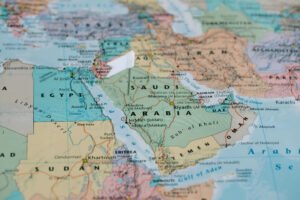Introduction
Oil is one of the most valuable natural resources in the modern world. It is often referred to as “black gold” because of the immense wealth and power it brings. Among the regions most affected by oil, the Gulf States—including Saudi Arabia, Kuwait, Qatar, Bahrain, and the United Arab Emirates (UAE)—hold a central place. Today, these countries are known for their modern skylines, advanced infrastructure, and prosperous lifestyles. However, the Gulf’s story before the discovery of oil was very different. The transition from poor desert communities to some of the world’s richest nations is one of the most remarkable transformations in modern history.
Prior to these major changes, there were no big cities, no modern facilities, and limited opportunities across the region. However, the turning point came in the early 20th century. In 1932, Bahrain became the first Gulf country where oil was discovered. Soon after, huge oil reserves were found in Saudi Arabia, Kuwait, and other Gulf states. At the beginning, Western companies helped in drilling and producing the oil
Refinery in Desert or Sea Oil Production
As a result of these discoveries, by the 1940s and 1950s, oil production increased rapidly. The money from oil exports changed the Gulf countries completely. The government invested in schools, hospitals, roads, airports, and new cities. People’s lives improved as education and healthcare became available. Many foreign workers also moved to the Gulf to work in the growing oil industry.
This newfound wealth and significance meant that oil also gave the Gulf region global importance. In 1960, oil-producing countries, including the Gulf States, formed OPEC (Organization of Petroleum Exporting Countries). This organization protected its interests and gained more control over oil prices. From that time, the Gulf became the center of the world’s energy supply.

· Formation: OPEC was created in 1960 in Baghdad, Iraq
By the five-member Saudi Arabia, Iraq, Iran, Kuwait, and Venezuela
· Headquarters: OPEC headquarters in Vienna, Austria
· Member: Qatar (later left), USA, and other now OPEC
Around 13 member countries
The importance of the oil Gulf,
especially Saudi Arabia, Kuwait, USA, plays a leading role because they have some of the largest oil reserves.
First of all, oil is the main Source of national income for most Gulf countries. Billions of dollars are earned every year export of though the export of oil and petroleum products. Since many nations depend on Gulf oil to run their industries, transport, and electricity, the Gulf has a great influence on the world economy. Through OPEC, Gulf countries also help decide oil production and prices, which affect the whole world.
Another big importance of oil is in changing lifestyles and development. After the oil boom, these countries became modern and advanced. Cities like Dubai, Doha, and Riyadh are now famous for tall buildings, luxury shopping, and international business centers. Today, the history of Gulf oil shows how one natural resource changed the destiny of an entire region. From poor desert land, the Gulf States have become modern, wealthy, and powerful nations. The discovery of oil in the Gulf major turning point in history it transforming the economy, improving society, and giving these countries a strong role in global politics. Oil is not just a resource here; it is the foundation of the Gulf’s success.
Social and Cultural Changes
Oil wealth not only brought economic growth; it also changed lifestyles and cultures across the Gulf. Traditional houses made of mud and palm leaves were replaced by modern villas and skyscrapers. Cars replaced camels as the main form of transport. Education spread rapidly, and literacy rates rose dramatically.
Cities such as Dubai became global hubs for tourism and business, with iconic landmarks like the Burj Khalifa. Doha hosted the FIFA World Cup in 2022, showcasing Qatar’s development. Riyadh is expanding under Saudi Arabia’s Vision 2030 program, which aims to diversify the economy beyond oil.
The role of women has also changed significantly. Access to education and work opportunities has grown, although cultural traditions still play an important role in society.
Foreign Workers and Multiculturalism
Another important outcome of the oil boom has been the influx of foreign workers. Millions of people from South Asia (India, Pakistan, Bangladesh), the Philippines, Africa, and Western countries migrated to the Gulf for jobs in construction, healthcare, finance, and domestic services.
This migration created a multicultural society, where locals live alongside expatriates from around the world. In some Gulf countries, expatriates even outnumber local citizens. While this has enriched Gulf culture, it has also created challenges in terms of identity and national integration.
Global Importance of Gulf Oil
Oil has given the Gulf immense global importance. The region controls a large share of the world’s oil reserves, with Saudi Arabia alone holding around 17% of proven reserves. Many nations depend on Gulf oil to power their industries, transport, and electricity.
Through OPEC, Gulf countries influence oil production and prices, directly affecting the global economy. For example, changes in oil prices impact inflation, transportation costs, and even international relations. The Gulf has therefore become a strategic partner for major powers such as the United States, China, and the European Union.
Challenges and the Future
Despite its success, the Gulf faces challenges. Heavy dependence on oil is risky because prices are unpredictable, and the world is moving toward renewable energy to combat climate change. Falling oil demand in the future could threaten Gulf economies if they do not diversify.
Recognizing this, countries like Saudi Arabia (Vision 2030) and the UAE (Energy Strategy 2050) are investing in solar power, tourism, finance, and technology to create more balanced economies. The transition from oil to a diversified economy is perhaps the Gulf’s next great challenge.
Conclusion
The discovery of oil was the defining moment in the history of the Gulf region. Within less than a century, the Gulf transformed from poor desert societies into some of the wealthiest and most influential nations in the world. Oil brought not only economic prosperity but also education, healthcare, modern cities, and global significance.
While oil remains the foundation of its success, the future will depend on how these countries adapt to a changing world where renewable energy and technology may replace oil as the driver of global progress.
From pearl divers to skyscrapers, from deserts to global business hubs, the Gulf’s journey shows how one natural resource can reshape the destiny of nations.

